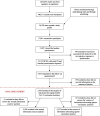Hesitancy for receiving regular SARS-CoV-2 vaccination in UK healthcare workers: a cross-sectional analysis from the UK-REACH study
- PMID: 36210437
- PMCID: PMC9548389
- DOI: 10.1186/s12916-022-02588-7
Hesitancy for receiving regular SARS-CoV-2 vaccination in UK healthcare workers: a cross-sectional analysis from the UK-REACH study
Abstract
Background: Regular vaccination against SARS-CoV-2 may be needed to maintain immunity in 'at-risk' populations, which include healthcare workers (HCWs). However, little is known about the proportion of HCWs who might be hesitant about receiving a hypothetical regular SARS-CoV-2 vaccination or the factors associated with this hesitancy.
Methods: Cross-sectional analysis of questionnaire data collected as part of UK-REACH, a nationwide, longitudinal cohort study of HCWs. The outcome measure was binary, either a participant indicated they would definitely accept regular SARS-CoV-2 vaccination if recommended or they indicated some degree of hesitancy regarding acceptance (probably accept or less likely). We used logistic regression to identify factors associated with hesitancy for receiving regular vaccination.
Results: A total of 5454 HCWs were included in the analysed cohort, 23.5% of whom were hesitant about regular SARS-CoV-2 vaccination. Black HCWs were more likely to be hesitant than White HCWs (aOR 2.60, 95%CI 1.80-3.72) as were those who reported a previous episode of COVID-19 (1.33, 1.13-1.57 [vs those who tested negative]). Those who received influenza vaccination in the previous two seasons were over five times less likely to report hesitancy for regular SARS-CoV-2 vaccination than those not vaccinated against influenza in either season (0.18, 0.14-0.21). HCWs who trusted official sources of vaccine information (such as NHS or government adverts or websites) were less likely to report hesitancy for a regular vaccination programme. Those who had been exposed to information advocating against vaccination from friends and family were more likely to be hesitant.
Conclusions: In this study, nearly a quarter of UK HCWs were hesitant about receiving a regular SARS-CoV-2 vaccination. We have identified key factors associated with hesitancy for regular SARS-CoV-2 vaccination, which can be used to identify groups of HCWs at the highest risk of vaccine hesitancy and tailor interventions accordingly. Family and friends of HCWs may influence decisions about regular vaccination. This implies that working with HCWs and their social networks to allay concerns about SARS-CoV-2 vaccination could improve uptake in a regular vaccination programme.
Trial registration: ISRCTN Registry, ISRCTN11811602.
Keywords: COVID-19; Ethnicity; Healthcare; Hesitancy; SARS-CoV-2; Vaccination.
© 2022. The Author(s).
Conflict of interest statement
KK is the Director of the University of Leicester Centre for Black Minority Ethnic Health, Trustee of the South Asian Health Foundation and Chair of the Ethnicity Subgroup of the UK Government Scientific Advisory Group for Emergencies (SAGE). MP reports grants from Sanofi, grants and personal fees from Gilead Sciences and personal fees from QIAGEN, outside the submitted work.
Figures


Comment in
-
Sources of vaccine information may have role in decreasing hesitancy among healthcare workers in UK toward receiving COVID-19 regularly.Evid Based Nurs. 2023 Oct;26(4):138. doi: 10.1136/ebnurs-2022-103666. Epub 2023 Mar 17. Evid Based Nurs. 2023. PMID: 36931704 No abstract available.
References
-
- Agrawal U, Katikireddi SV, McCowan C, Mulholland RH, Azcoaga-Lorenzo A, Amele S, et al. COVID-19 hospital admissions and deaths after BNT162b2 and ChAdOx1 nCoV-19 vaccinations in 2·57 million people in Scotland (EAVE II): a prospective cohort study. Lancet Respir Med. 2021;9(12):1439–1449. doi: 10.1016/S2213-2600(21)00380-5. - DOI - PMC - PubMed
Publication types
MeSH terms
Substances
Associated data
Grants and funding
LinkOut - more resources
Full Text Sources
Medical
Miscellaneous

